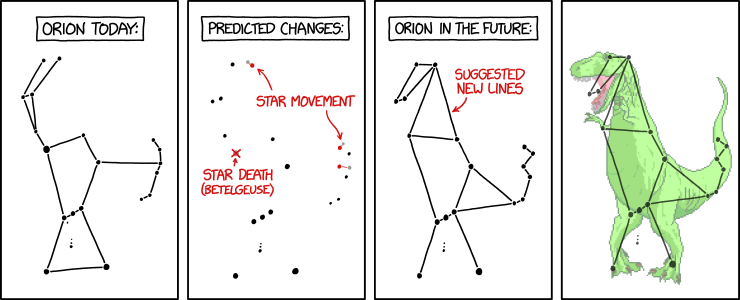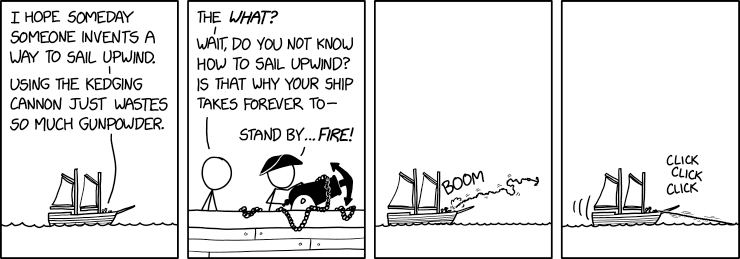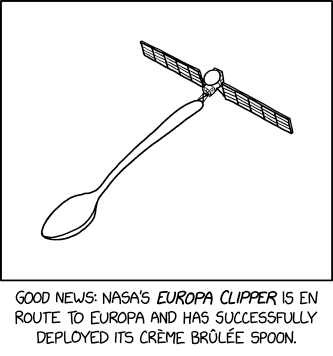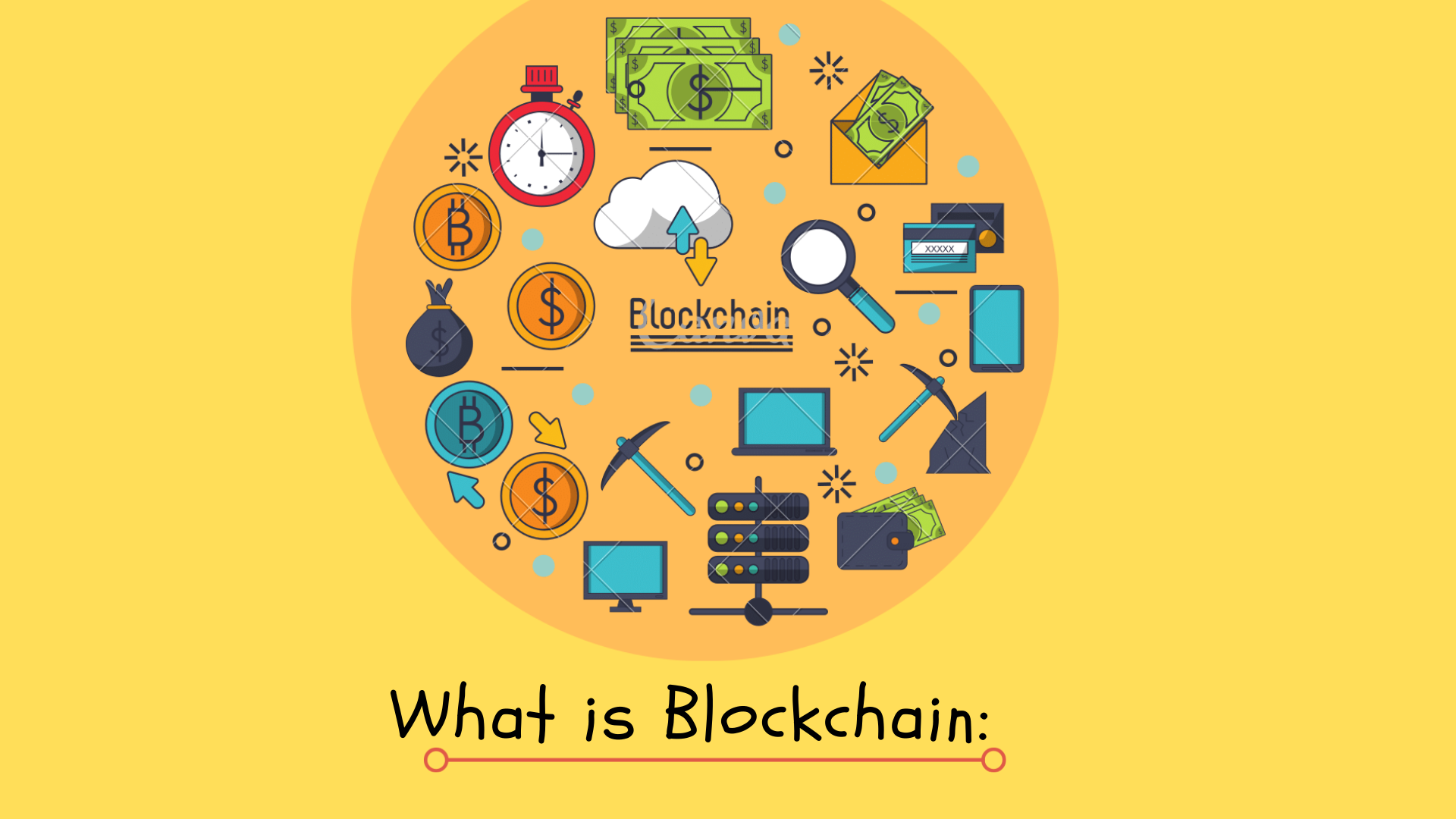********** XKCD **********
return to top
The Future of Orion
Match ID: 0 Score: 1000.00 source: xkcd.com
qualifiers: 1000.00 xkcd
Kedging Cannon
Match ID: 1 Score: 1000.00 source: xkcd.com
qualifiers: 1000.00 xkcd
Europa Clipper
Match ID: 2 Score: 1000.00 source: xkcd.com
qualifiers: 1000.00 xkcd
Arizona Chess
Match ID: 3 Score: 1000.00 source: xkcd.com
qualifiers: 1000.00 xkcd
Filter efficiency 99.601 (4 matches/1003 results)
********** FOOD **********
return to top
Our best bread recipes for Thanksgiving, including rolls and biscuits
Thu, 21 Nov 2024 15:00:54 +0000
Whether you want Thanksgiving rolls or stuffing-inspired bread, these recipes will be right at home on your holiday table.
Match ID: 0 Score: 50.00 source: www.washingtonpost.com age: 0 days
qualifiers: 30.00 food, 20.00 recipes
We’re closer to re-creating the sounds of Parasaurolophus
Thu, 21 Nov 2024 21:30:19 +0000
Preliminary model suggests the dinosaur bellowed like a large trumpet or saxophone, or perhaps a clarinet.
Match ID: 1 Score: 30.00 source: arstechnica.com age: 0 days
qualifiers: 30.00 food
Charlie Palmer Steak, a longtime D.C. power-broker hangout, is closing
Thu, 21 Nov 2024 21:26:25 +0000
Charlie Palmer Steak has hosted Washington’s movers and shakers for more than two decades, but it couldn’t reach a deal with its landlord to stay.
Match ID: 2 Score: 30.00 source: www.washingtonpost.com age: 0 days
qualifiers: 30.00 food
Preguntas frecuentes: La verdadera historia del cuidado de la salud de los astronautas en el espacio
Thu, 21 Nov 2024 20:12:05 +0000
Read this story in English here. La Estación Espacial Internacional es el hogar de la humanidad en el espacio y una estación de investigación que gira en órbita sobre la Tierra a unos 400 kilómetros (250 millas) de altura. La NASA y sus socios internacionales han mantenido una presencia humana continua a bordo de la […]
Match ID: 3 Score: 30.00 source: www.nasa.gov age: 0 days
qualifiers: 30.00 food
FAQ: The Real Story About Astronaut Health Care in Space
Thu, 21 Nov 2024 20:10:17 +0000
Lee esta historia en español aquí. The International Space Station is humanity’s home in space and a research station orbiting about 250 miles above the Earth. NASA and its international partners have maintained a continuous human presence aboard the space station for more than 24 years, conducting research that is not possible on Earth. The […]
Match ID: 4 Score: 30.00 source: www.nasa.gov age: 0 days
qualifiers: 30.00 food
The best coffee machines: your morning brew made easy, according to our expert
Thu, 21 Nov 2024 18:00:01 GMT
Discover the perfect coffee maker for your home with our tried-and-tested recommendations, from simple capsule to fully manual espresso machines
• How to choose the right type of coffee machine for you
When it comes to something as earth-shatteringly important as coffee, everyone has an opinion. Some crave a single perfect shot of espresso, while others seek the milkiest latte; some love Starbucks and others, well, don’t. This is why the idea of there being a single best coffee machine is fanciful – everyone’s idea of the perfect coffee couldn’t be more different.
As a selfless service to coffee drinkers everywhere, I’ve spent months researching and testing coffee machines to produce a shortlist of tried-and-tested recommendations. The list spans all the main types of coffee maker: manual espresso, filter, bean-to-cup and capsule (not sure what all of this means? Read our dedicated guide to the different types of coffee machine.
Best manual machine for beginners:
Sage Bambino Plus
£349 at John Lewis
Best low-effort coffee at an affordable price:
De’Longhi Magnifica Evo One Touch
£375 at John Lewis
Best for simple filter coffee:
Moccamaster KBG Select
£218 at AO
Best for capsules:
L’or Barista Sublime
£218 at AO
Best low-effort premium coffee:
Jura C8
£895 at John Lewis
Best capsule machine for long coffees:
Nespresso Vertuo Plus
£199 at Nespresso
Democratic support for the bill dwindled as critics warned it would let Donald Trump crack down on political foes.
The post The House Just Blessed Trump’s Authoritarian Playbook by Passing Nonprofit-Killer Bill appeared first on The Intercept.
(Bella Union)
The singer-songwriter sticks to apocalyptic first principles on his sixth album, couching contemporary chaos in soaring ballads and discofied yacht rock
Nine years after his breakthrough album I Love You, Honeybear turned Josh Tillman from a minor indie singer-songwriter (and the former drummer of Fleet Foxes) into a critical cause célèbre, most people with any interest know broadly what to expect from a new release under the Father John Misty name. There will be blackly comic depictions of existential angst and apocalyptic dread. Songs that suggest life in the 21st century is basically unbearable and that the world is irredeemably screwed will vie with fourth wall-breaking moments where Tillman confesses his own complicity in screwing up the world. There will be barbed drawings of human relations, bleakly funny ruminations on ageing, self-lacerating reflections on his own music and career, stuff about Los Angeles, Tillman’s adopted home town, and, frequently, a lurid microcosm of all that’s wrong with the world.
Suffice to say that Mahashmashana ticks all those boxes. Indeed, it ticks quite a lot of them over the course of the opening title track, which sets a melody that evokes FJM’s most enduring musical touchstone, early 70s Elton John, to an arrangement that recalls the overripe Phil Spector production of George Harrison’s All Things Must Pass. It takes its name from a Sanskrit world meaning “great cremation ground” and alternates between describing “the next universal dawn” breaking over a silent world, and a troubled relationship between a man whose body is metaphorically compared to a chain of southern Californian gourmet food markets and a woman whose soul is a “fallen star”. Modern-day life is “a scheme to enrich assholes”, Tillman avers, before poking his head through the fourth wall and taunting himself for his pomposity: “Such revelations,” he sings, with a parenthetical roll of the eyes, “which only singers can describe.”
Continue reading...Israeli attacks have destroyed huge areas of land used for crops, with 90% of cattle killed, analysis shows
More than 90% of cattle have died and about 70% of land for crops in Gaza has been destroyed or damaged since the beginning of the war in the territory, an analysis of satellite imagery by the UN has found.
More than half of sheep and goat herds have been wiped out, while more than three-quarters of the territory’s famous orchards have been destroyed or damaged, the survey in September found.
Continue reading...Wars have spread and intensified, with far-reaching impacts on global economic growth and food security, according to latest Conflict Intensity Index
The proportion of the world engulfed by conflict has grown 65% – equivalent to nearly double the size of India – over the past three years, according to a new report.
Ukraine, Myanmar, the Middle East and a “conflict corridor” around Africa’s Sahel region have seen wars and unrest spread and intensify since 2021, according to the latest Conflict Intensity Index (CII), published by risk analysts Verisk Maplecroft.
Continue reading...Sanders’s resolutions to block arms sales to Israel gained momentum, but ran headlong into White House opposition.
The post Bernie Sanders Lost Vote to Block Arms for Israel, Says U.S. Is “Funding the Starvation of Children in Gaza” appeared first on The Intercept.
Nine health care workers at UCSF report censorship or punishment for speaking out about human rights for Palestinians — or simply wearing a pin.
The post San Francisco’s Biggest Hospital System: Don’t Talk About Palestine appeared first on The Intercept.
From timeless kitchenware to trending ingredients, here’s the Observer Food’s Monthly’s pick of presents to bring good cheer
We’ve assembled some of the most delightful and desirable culinary-adjacent items you might wish to give, or receive, this season.
Kitchen utensils that are as aesthetically pleasing as they are useful, quirky homewares and jars of things we love to eat – our list runs the gamut from “essential” to “truly essential”.
Continue reading...In the face of a second Trump term, the left must cultivate a politics of everyday life that goes beyond voting, says columnist Natasha Lennard.
The post Radical Action Under Trump appeared first on The Intercept.
I get Kennedy’s appeal, but Trump will undo the protections with the most direct, proven impact on our health.
The post RFK Jr. Talks About Public Health, but He’s Joining an Administration That’ll Make Us Sicker Than Ever appeared first on The Intercept.
A weekly email from Yotam Ottolenghi, Meera Sodha, Felicity Cloake and Rachel Roddy, featuring the latest recipes and seasonal eating ideas
Each week we’ll send you an exclusive newsletter from our star food writers. We’ll also send you the latest recipes from Yotam Ottolenghi, Nigel Slater, Meera Sodha and all our star cooks, stand-out food features and seasonal eating inspiration, plus restaurant reviews from Grace Dent and Jay Rayner.
Sign up below to start receiving the best of our culinary journalism in one mouth-watering weekly email.
Continue reading...Style, with substance: what’s really trending this week, a roundup of the best fashion journalism and your wardrobe dilemmas solved, direct to your inbox every Thursday
Style, with substance: what’s really trending this week, a roundup of the best fashion journalism and your wardrobe dilemmas solved, delivered straight to your inbox every Thursday
Explore all our newsletters: whether you love film, football, fashion or food, we’ve got something for you
Continue reading... |
Imagine a world in which you can do transactions and many other things without having to give your personal information. A world in which you don’t need to rely on banks or governments anymore. Sounds amazing, right? That’s exactly what blockchain technology allows us to do.
It’s like your computer’s hard drive. blockchain is a technology that lets you store data in digital blocks, which are connected together like links in a chain.
Blockchain technology was originally invented in 1991 by two mathematicians, Stuart Haber and W. Scot Stornetta. They first proposed the system to ensure that timestamps could not be tampered with.
A few years later, in 1998, software developer Nick Szabo proposed using a similar kind of technology to secure a digital payments system he called “Bit Gold.” However, this innovation was not adopted until Satoshi Nakamoto claimed to have invented the first Blockchain and Bitcoin.
A blockchain is a distributed database shared between the nodes of a computer network. It saves information in digital format. Many people first heard of blockchain technology when they started to look up information about bitcoin.
Blockchain is used in cryptocurrency systems to ensure secure, decentralized records of transactions.
Blockchain allowed people to guarantee the fidelity and security of a record of data without the need for a third party to ensure accuracy.
To understand how a blockchain works, Consider these basic steps:
Let’s get to know more about the blockchain.
Blockchain records digital information and distributes it across the network without changing it. The information is distributed among many users and stored in an immutable, permanent ledger that can't be changed or destroyed. That's why blockchain is also called "Distributed Ledger Technology" or DLT.
Here’s how it works:
And that’s the beauty of it! The process may seem complicated, but it’s done in minutes with modern technology. And because technology is advancing rapidly, I expect things to move even more quickly than ever.
Even though blockchain is integral to cryptocurrency, it has other applications. For example, blockchain can be used for storing reliable data about transactions. Many people confuse blockchain with cryptocurrencies like bitcoin and ethereum.
Blockchain already being adopted by some big-name companies, such as Walmart, AIG, Siemens, Pfizer, and Unilever. For example, IBM's Food Trust uses blockchain to track food's journey before reaching its final destination.
Although some of you may consider this practice excessive, food suppliers and manufacturers adhere to the policy of tracing their products because bacteria such as E. coli and Salmonella have been found in packaged foods. In addition, there have been isolated cases where dangerous allergens such as peanuts have accidentally been introduced into certain products.
Tracing and identifying the sources of an outbreak is a challenging task that can take months or years. Thanks to the Blockchain, however, companies now know exactly where their food has been—so they can trace its location and prevent future outbreaks.
Blockchain technology allows systems to react much faster in the event of a hazard. It also has many other uses in the modern world.
Blockchain technology is safe, even if it’s public. People can access the technology using an internet connection.
Have you ever been in a situation where you had all your data stored at one place and that one secure place got compromised? Wouldn't it be great if there was a way to prevent your data from leaking out even when the security of your storage systems is compromised?
Blockchain technology provides a way of avoiding this situation by using multiple computers at different locations to store information about transactions. If one computer experiences problems with a transaction, it will not affect the other nodes.
Instead, other nodes will use the correct information to cross-reference your incorrect node. This is called “Decentralization,” meaning all the information is stored in multiple places.
Blockchain guarantees your data's authenticity—not just its accuracy, but also its irreversibility. It can also be used to store data that are difficult to register, like legal contracts, state identifications, or a company's product inventory.
Blockchain has many advantages and disadvantages.
I’ll answer the most frequently asked questions about blockchain in this section.
Blockchain is not a cryptocurrency but a technology that makes cryptocurrencies possible. It's a digital ledger that records every transaction seamlessly.
Yes, blockchain can be theoretically hacked, but it is a complicated task to be achieved. A network of users constantly reviews it, which makes hacking the blockchain difficult.
Coinbase Global is currently the biggest blockchain company in the world. The company runs a commendable infrastructure, services, and technology for the digital currency economy.
Blockchain is a decentralized technology. It’s a chain of distributed ledgers connected with nodes. Each node can be any electronic device. Thus, one owns blockhain.
Bitcoin is a cryptocurrency, which is powered by Blockchain technology while Blockchain is a distributed ledger of cryptocurrency
Generally a database is a collection of data which can be stored and organized using a database management system. The people who have access to the database can view or edit the information stored there. The client-server network architecture is used to implement databases. whereas a blockchain is a growing list of records, called blocks, stored in a distributed system. Each block contains a cryptographic hash of the previous block, timestamp and transaction information. Modification of data is not allowed due to the design of the blockchain. The technology allows decentralized control and eliminates risks of data modification by other parties.
Blockchain has a wide spectrum of applications and, over the next 5-10 years, we will likely see it being integrated into all sorts of industries. From finance to healthcare, blockchain could revolutionize the way we store and share data. Although there is some hesitation to adopt blockchain systems right now, that won't be the case in 2022-2023 (and even less so in 2026). Once people become more comfortable with the technology and understand how it can work for them, owners, CEOs and entrepreneurs alike will be quick to leverage blockchain technology for their own gain. Hope you like this article if you have any question let me know in the comments section
FOLLOW US ON TWITTER
Non-fungible tokens (NFTs) are the most popular digital assets today, capturing the attention of cryptocurrency investors, whales and people from around the world. People find it amazing that some users spend thousands or millions of dollars on a single NFT-based image of a monkey or other token, but you can simply take a screenshot for free. So here we share some freuently asked question about NFTs.
NFT stands for non-fungible token, which is a cryptographic token on a blockchain with unique identification codes that distinguish it from other tokens. NFTs are unique and not interchangeable, which means no two NFTs are the same. NFTs can be a unique artwork, GIF, Images, videos, Audio album. in-game items, collectibles etc.
A blockchain is a distributed digital ledger that allows for the secure storage of data. By recording any kind of information—such as bank account transactions, the ownership of Non-Fungible Tokens (NFTs), or Decentralized Finance (DeFi) smart contracts—in one place, and distributing it to many different computers, blockchains ensure that data can’t be manipulated without everyone in the system being aware.
The value of an NFT comes from its ability to be traded freely and securely on the blockchain, which is not possible with other current digital ownership solutionsThe NFT points to its location on the blockchain, but doesn’t necessarily contain the digital property. For example, if you replace one bitcoin with another, you will still have the same thing. If you buy a non-fungible item, such as a movie ticket, it is impossible to replace it with any other movie ticket because each ticket is unique to a specific time and place.
One of the unique characteristics of non-fungible tokens (NFTs) is that they can be tokenised to create a digital certificate of ownership that can be bought, sold and traded on the blockchain.
As with crypto-currency, records of who owns what are stored on a ledger that is maintained by thousands of computers around the world. These records can’t be forged because the whole system operates on an open-source network.
NFTs also contain smart contracts—small computer programs that run on the blockchain—that give the artist, for example, a cut of any future sale of the token.
Non-fungible tokens (NFTs) aren't cryptocurrencies, but they do use blockchain technology. Many NFTs are based on Ethereum, where the blockchain serves as a ledger for all the transactions related to said NFT and the properties it represents.5) How to make an NFT?
Anyone can create an NFT. All you need is a digital wallet, some ethereum tokens and a connection to an NFT marketplace where you’ll be able to upload and sell your creations
When you purchase a stock in NFT, that purchase is recorded on the blockchain—the bitcoin ledger of transactions—and that entry acts as your proof of ownership.
The value of an NFT varies a lot based on the digital asset up for grabs. People use NFTs to trade and sell digital art, so when creating an NFT, you should consider the popularity of your digital artwork along with historical statistics.
In the year 2021, a digital artist called Pak created an artwork called The Merge. It was sold on the Nifty Gateway NFT market for $91.8 million.
Non-fungible tokens can be used in investment opportunities. One can purchase an NFT and resell it at a profit. Certain NFT marketplaces let sellers of NFTs keep a percentage of the profits from sales of the assets they create.
Many people want to buy NFTs because it lets them support the arts and own something cool from their favorite musicians, brands, and celebrities. NFTs also give artists an opportunity to program in continual royalties if someone buys their work. Galleries see this as a way to reach new buyers interested in art.
There are many places to buy digital assets, like opensea and their policies vary. On top shot, for instance, you sign up for a waitlist that can be thousands of people long. When a digital asset goes on sale, you are occasionally chosen to purchase it.
To mint an NFT token, you must pay some amount of gas fee to process the transaction on the Etherum blockchain, but you can mint your NFT on a different blockchain called Polygon to avoid paying gas fees. This option is available on OpenSea and this simply denotes that your NFT will only be able to trade using Polygon's blockchain and not Etherum's blockchain. Mintable allows you to mint NFTs for free without paying any gas fees.
The answer is no. Non-Fungible Tokens are minted on the blockchain using cryptocurrencies such as Etherum, Solana, Polygon, and so on. Once a Non-Fungible Token is minted, the transaction is recorded on the blockchain and the contract or license is awarded to whoever has that Non-Fungible Token in their wallet.
You can sell your work and creations by attaching a license to it on the blockchain, where its ownership can be transferred. This lets you get exposure without losing full ownership of your work. Some of the most successful projects include Cryptopunks, Bored Ape Yatch Club NFTs, SandBox, World of Women and so on. These NFT projects have gained popularity globally and are owned by celebrities and other successful entrepreneurs. Owning one of these NFTs gives you an automatic ticket to exclusive business meetings and life-changing connections.
That’s a wrap. Hope you guys found this article enlightening. I just answer some question with my limited knowledge about NFTs. If you have any questions or suggestions, feel free to drop them in the comment section below. Also I have a question for you, Is bitcoin an NFTs? let me know in The comment section below
The fights over Gaza protests are playing out online, in campus quads, internal disciplinary proceedings, and in the courts.
The post From Campus to the Courts, the “Palestine Exception” Rules University Crackdowns appeared first on The Intercept.
Mathangi Arulpragasam has been mixing it up for more than 20 years, blending Bollywood and Suicide samples with funk, electro and hip-hop. We select her standout cuts
In contrast to her first attention-grabbing mixtape (2004’s Piracy Funds Terrorism), 2023’s Bells Collection slipped out virtually unnoticed: to say its lo-fi, Christian-themed contents divided fans is putting it mildly, but Solitude’s murky synth arpeggios and reflective mood were good enough to surmount some clumsy lyrics (“You used to have gurus, now it’s Google” etc).
Continue reading...RSS Rabbit links users to publicly available RSS entries.
Vet every link before clicking! The creators accept no responsibility for the contents of these entries.
Relevant
Fresh
Convenient
Agile
We're not prepared to take user feedback yet. Check back soon!